Experiences Are Forever
14 September 2020
Important things to know before
you visit Cuba
Cuba is one of our favourite places on earth so it’s unsurprising that it’s become one of the world’s hottest destinations.
Despite this, travellers may face some difficulties when visiting this wonderful Caribbean nation. So we recommend doing research before you go.
To save you time we’ve have compiled a list of the most important things to know before you visit Cuba. This list will prepare you for your travels and help ensure you have an incredible experience on this epic island.
Table of contents:
- Cuba is economically disadvantaged
- Internet is scarce
- Stay at a casa particular
- Eat at paladars
- Take enough cash for your whole trip
- Exchanging cash
- There are two local currencies
- Be aware of scams
- How to travel to around the country
- How to get a visa
- You must have health insurance to visit Cuba
- Cuba is a pretty safe country
- You’ll need some Spanish
- Can I drink the water?
- Vaccinations
Cuba is economically disadvantaged
As we’ve mentioned before, Cuba has endured enormous economic strain over the last six decades. Partly as a result of the infamous US trade embargo.
Being cut off from the world and foreign investment has cultivated a culturally rich and exciting destination for travellers, but its crippling financial impact has meant that life for most Cubans is tough. Most earn a very small wage and face frequent food and supply shortages.
It’s important to take this into account when travelling to Cuba, as western standards can’t always be met and things don’t always work as they should.
We’d recommend reading some books about the history of Cuba such as ‘Cuba: What Everyone Needs to Know’ by Julia Sweig. Or watching some documentaries such as ‘The Cuba Libre Story’ or ‘Cuba and the Cameraman’ on Netflix before you go.
Learning about Cuba’s complex heritage will give you a better understanding of this nation. It will also make you a more empathetic and tolerant traveller.
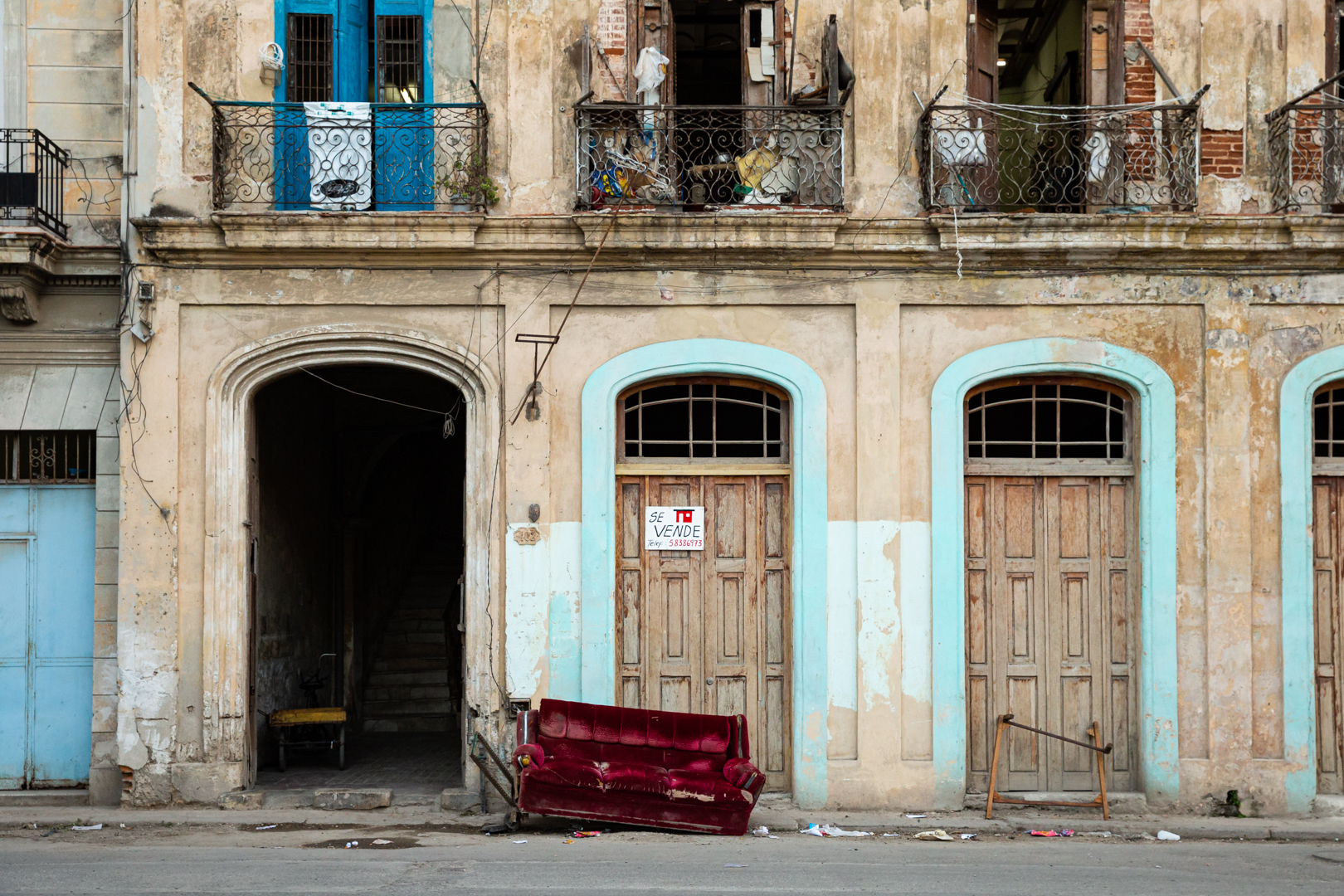
Internet is scarce
There are many important things to know before you visit Cuba, but the one that concerns travellers the most is the lack of internet. While internet access and mobile phone coverage in Cuba is improving, it is unreliable and can be an effort to get.
We enjoyed putting down our phones and taking a break from the web, but for those who are desperate to get online here are your options:
Your phone might work in Cuba: It’s worth asking your phone provider about this before you travel and the cost of roaming charges as they can be expensive. For those from Australia, we learnt that you will have zero coverage if you are with Optus or Vodafone.
You can buy a tourist sim card from Cubacel Tur: You must buy this online here in advance for $25CUC. You’ll receive 1G of data, twenty calls and texts and you can buy extra data when picking up your card. The card which will expire after thirty days can be picked up from terminal three of the José Martí Airport in Havana. You’ll find it at the CubaTur counter outside customs and immigration. Keep in mind that the rates of use are expensive and you’ll need to contact your phone provider before your travel to make sure your phone is unlocked.
Buy a NAUTA internet card: In our opinion, this is the best way to get internet as a tourist in Cuba. The cheapest places to buy these are the ETECSA offices, where you’ll need your passport to buy a card for $1CUC per hour of internet. Be aware that the lines can be long and you’ll need some Spanish to get through the transaction. It’s more convenient to buy these from the hotels but they tend to be more expensive.
Once you have the card you need to scratch to reveal the username and password and then login at a WIFI spot. You can access WIFI at most hotels, some casa particulares, ETECSA offices, the airport and many parks or main squares.
Remember that the internet won’t be as fast as at home and that it’s monitored by the Cuban government.
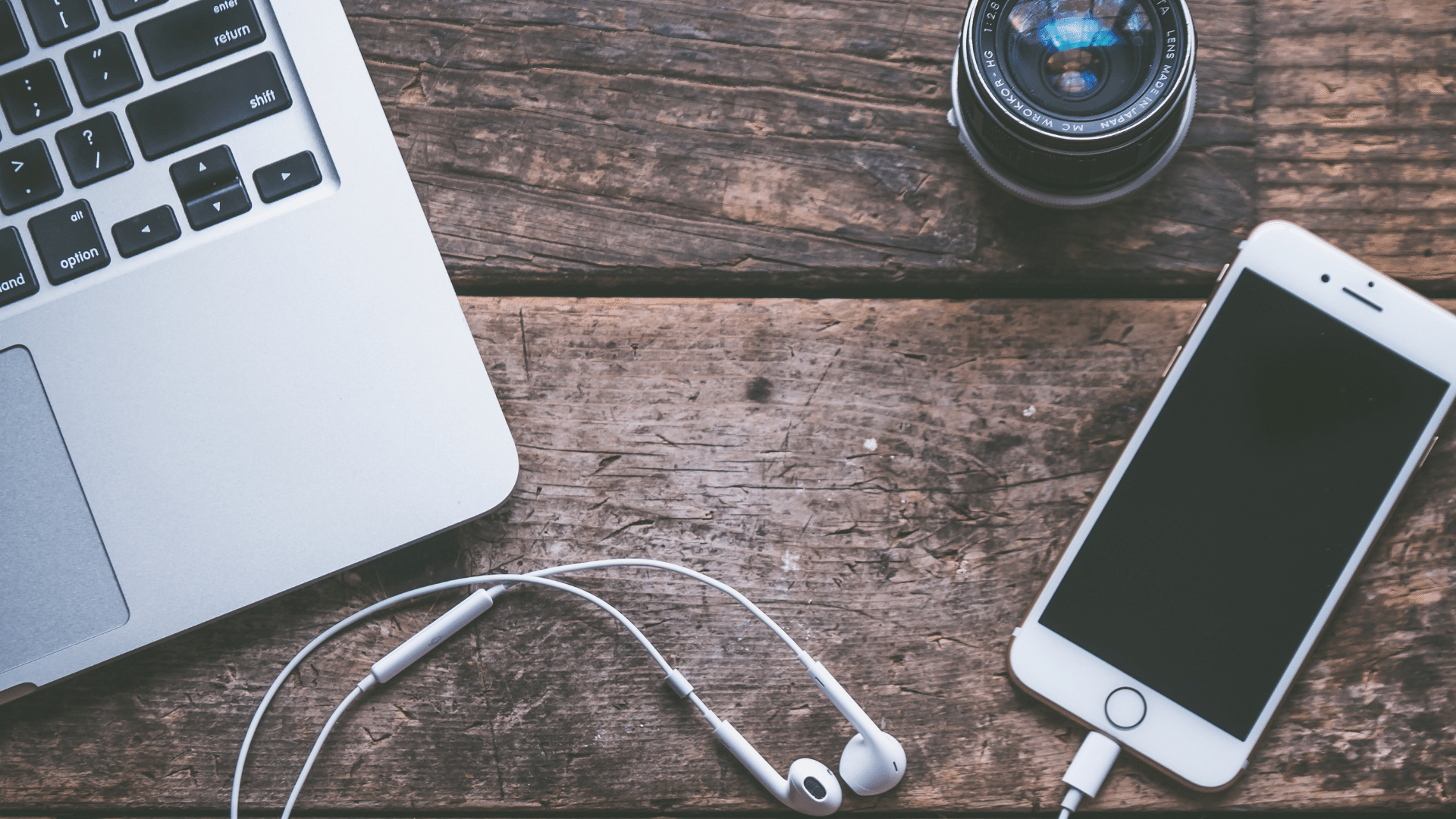
Image courtesy of Canva.
Stay at a casa particular
Most Cubans don’t earn much money so some supplement their incomes by charging guests to stay in their homes. This type of accommodation is a casa particular and it’s one of the best ways to have an authentic Cuban experience.
Staying in a casa particular will give you insight into the life of modern Cubans, a chance to support the locals, save money on accommodation (casas are much cheaper than most hotels) and an opportunity to taste some of the best food in Cuba. Often your casa particular will offer breakfast for an extra cost and sometimes dinner too.
There are plenty of ways to find casa particulares these days. You can book them online through websites like Airbnb, TripAdvisor and Booking.com, however due to limitations on internet availability it can be a difficult process and you can overpay (we learnt this the hard way!).
We found that the best way to find a casa particular is to ask around town. There are usually many options available and friendly locals will be able to show you places owned by people they know. A blue and white sign with an H on its side out the front of a building will also to tell you that it’s a registered casa.
For many this would be an anxiety-inducing scenario, but this is the way things work in Cuba. Its best to book accommodation in advance for your first night or two and then search for a casa for the following nights once you arrive. Your casa will also usually be able to suggest a good casa for you to stay in at the next town you’re visiting.

A casa particular in Trinidad, Cuba.
Eat at paladars
Not long ago all restaurants in Cuba were owned by the government. However, recent economic reforms have legalised private business ownership, resulting in an explosion of ‘paladars’ or privately owned restaurants on the Cuban dining scene.
Many friends have told tales of the terrible food in Cuba. Some probably ate at state-owned restaurants which are infamous for being ordinary. We had a very different experience. There are some nice restaurants in Cuba. Most of our meals were pretty good and some were great. But we had learned before we arrived that research is key and that stumbling into a venue off the street can leave you disappointed and ripped off.
It’s best to make a list of places you want to try before you go, as unreliable access to internet will make doing research when in Cuba difficult. When you have your list of places to try, mark them in your google maps. And give yourself offline access so that you aren’t left struggling to find each location without a map.
Something to note is that food shortages are common in Cuba and often cafes and restaurants will run out of certain menu items. Also remember that the meals you’re eating are out of reach for most Cubans, so be mindful of this before you complain about the food.
Take enough cash for the whole trip
Another important thing to know before you visit Cuba is that cash is king. We would recommend taking enough cash to cover your entire trip. Always take more than you think you need as you’ll be paying cash for virtually everything and many places don’t accept cards.
We have read recently that cards are more accepted in 2020, but cash is still number one. For credit cards, only Mastercard and Visa are accepted (and just in some places) and they incur a 5% fee with each sale.
ATMs are also scarce and have often run out of cash. However, we have read that the government is rolling out an additional one thousand ATMs across the country.
We found that our Australian bank cards didn’t work in most ATMs and have heard that US bank/ credit cards will not work at all.
You can visit some banks and use your passport and card to withdraw funds. But, we were only able to do this with the Banco Metropolitano in Havana and this may not be possible in country areas.
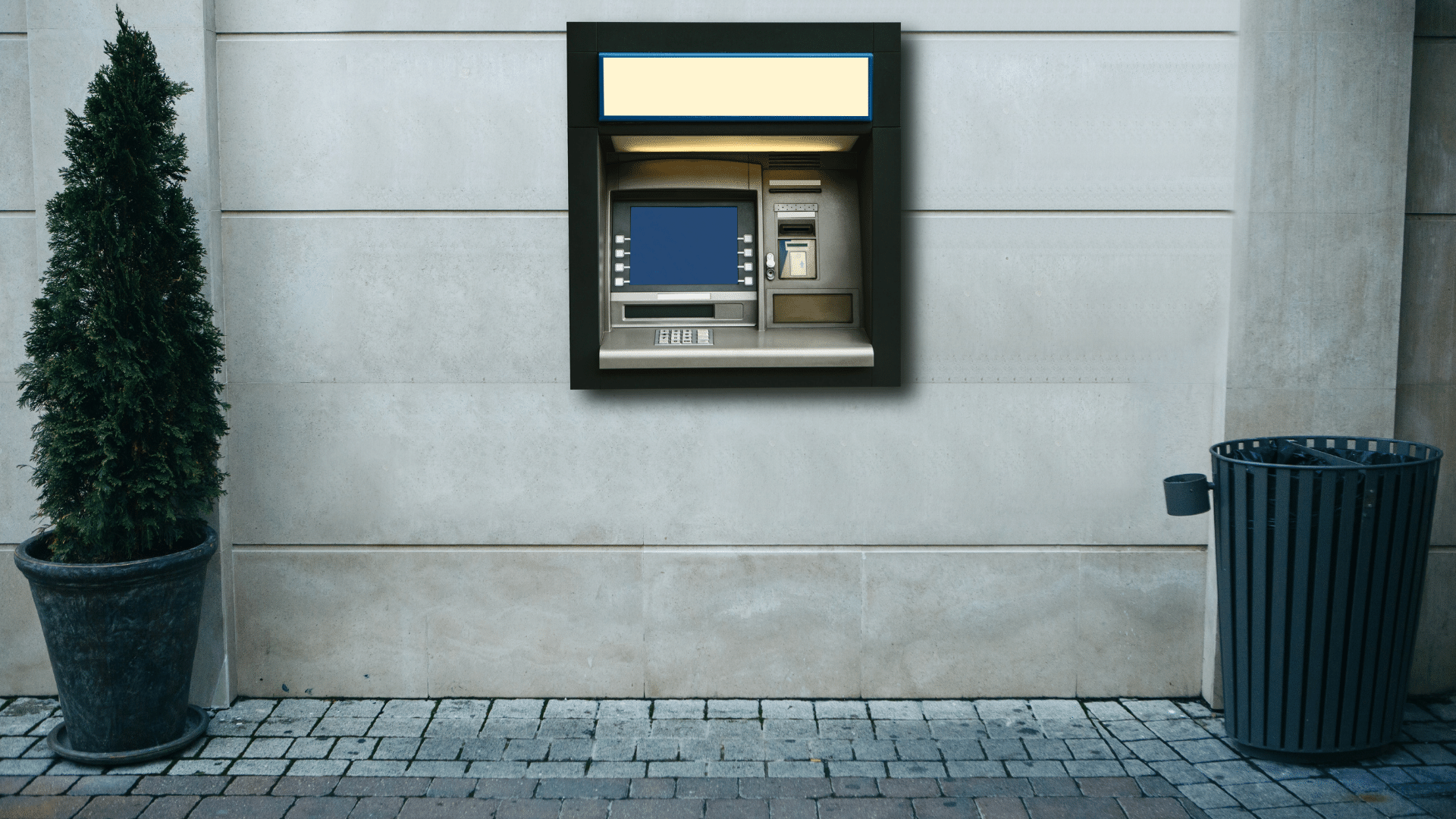
Image courtesy of Canva.
Exchanging cash
Unfortunately, you cannot get Cuban currency outside of Cuba so you’ll need to take an alternative currency to exchange. The best currencies to take to Cuba are the British Pound, the Euro and Canadian Dollar as they provide the best exchange rate. Don’t take Australian Dollars as you may have trouble exchanging them.
We have read recently in the Havana Times that the 10% tax on US Dollars has now been lifted. Some businesses in Cuba such as food stores, paladars, taxis and souvenir markets are now also accepting US Dollars, with change given in the Cuban CUC currency. This makes travel to Cuba even easier for US citizens.
It’s important to remember however, that it’s better to use the local currency when making purchases overseas, as you will pay extra when using US dollars and be more easily ripped off.
You can exchange your foreign currency for CUC at the following places:
- Airports – although the lines can be very long
- Cadecas or exchange houses in the city
- CFI and Banco Metropolitano banks
- Major hotels like the Hotel Nacional
All currencies incur a fee of 3%.
There are two local currencies
An important thing to know before you visit Cuba, is that there are two local currencies. One is the CUC or the convertible peso, which is pegged to the US Dollar (this is what you’ll get when exchanging foreign currency for Cuban cash) and the CUP or the Cuban peso. The latter is regarded as the national currency.
Tourists to Cuba tend to use the CUC, however the Cuban people mostly earn their wages in CUP.
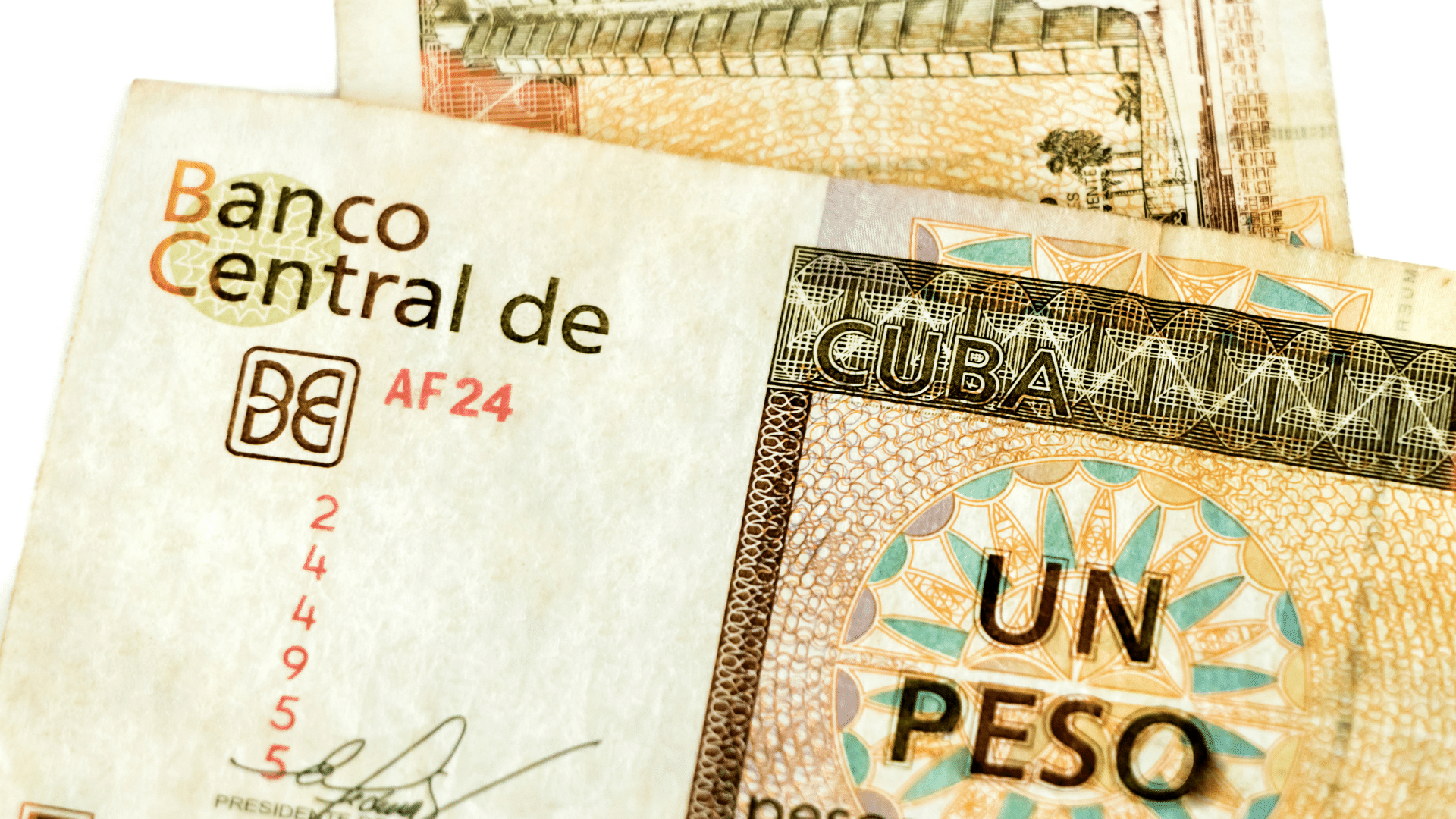
Image courtesy of Canva.
Be aware of scams
Cuba has a bit of a reputation for scammers and when you look at the economic situation you can understand why. Some extra dollars from a ‘wealthy traveller’ can go a long way.
Most scams are nothing that the average street-smart traveller can’t avoid and aren’t particularly sinister. We found that reading up on the common ones meant that we were better able to dodge them and our experience was pretty good. We only encountered a couple of these.
Here’s a list of the common ones we’ve heard about or encountered:
Giving you the wrong change: Some Cuban sellers like to take advantage of the difference between the two currencies. It’s a common scam in Cuba for a seller to give you change in CUP which is worth much less than the CUC and you may not realise until later.
For this reason, it’s worth noting the difference between the two currencies, the exchange rate and the way they look. Always remember to check your change before you walk away.
“I have no change”: This is when you purchase something and the shop keeper tells you they don’t have change. Whenever this happened, we threatened to buy the product from someone else and then our change would magically appear.
Extra items added to the bill: It’s important to know that sometimes restaurants add extra items to your bill, so always check it before you pay. Common victims of this are those using credit cards or travellers who have had a few too many drinks.
Cheap Cuban cigars: During your trip to Cuba you will be offered cheap Cuban cigars on the street for lower prices. They will tell you that they are real, but most are not. If you want to buy real Cuban cigars, your hotel or casa can direct you to the best places to buy them.
Internet cards that have already been scratched: Sometimes locals will stand in WIFI zones selling NAUTA internet cards. Some of these are legitimate but you need to check to see if the panel on the back has already been scratched. If it has then it has already been used and you are being scammed.
“I’ll show you a great restaurant where all the locals go”: If someone walks up to befriend you and suggests you go to a certain restaurant, they are probably getting a commission and may be lying about the quality of the food. Unless you’re eating at your casa, plan ahead and research where you want to eat and don’t stray from that.
Your Airbnb is not what you expected: Booking an Airbnb in advance, can mean that the property you booked may not be the one you end up with. Or you can end up paying way more than you should.
We booked an Airbnb in Trinidad and ended up paying six times the price. We discovered this after chatting to other guests who had found the place after walking in off the street.
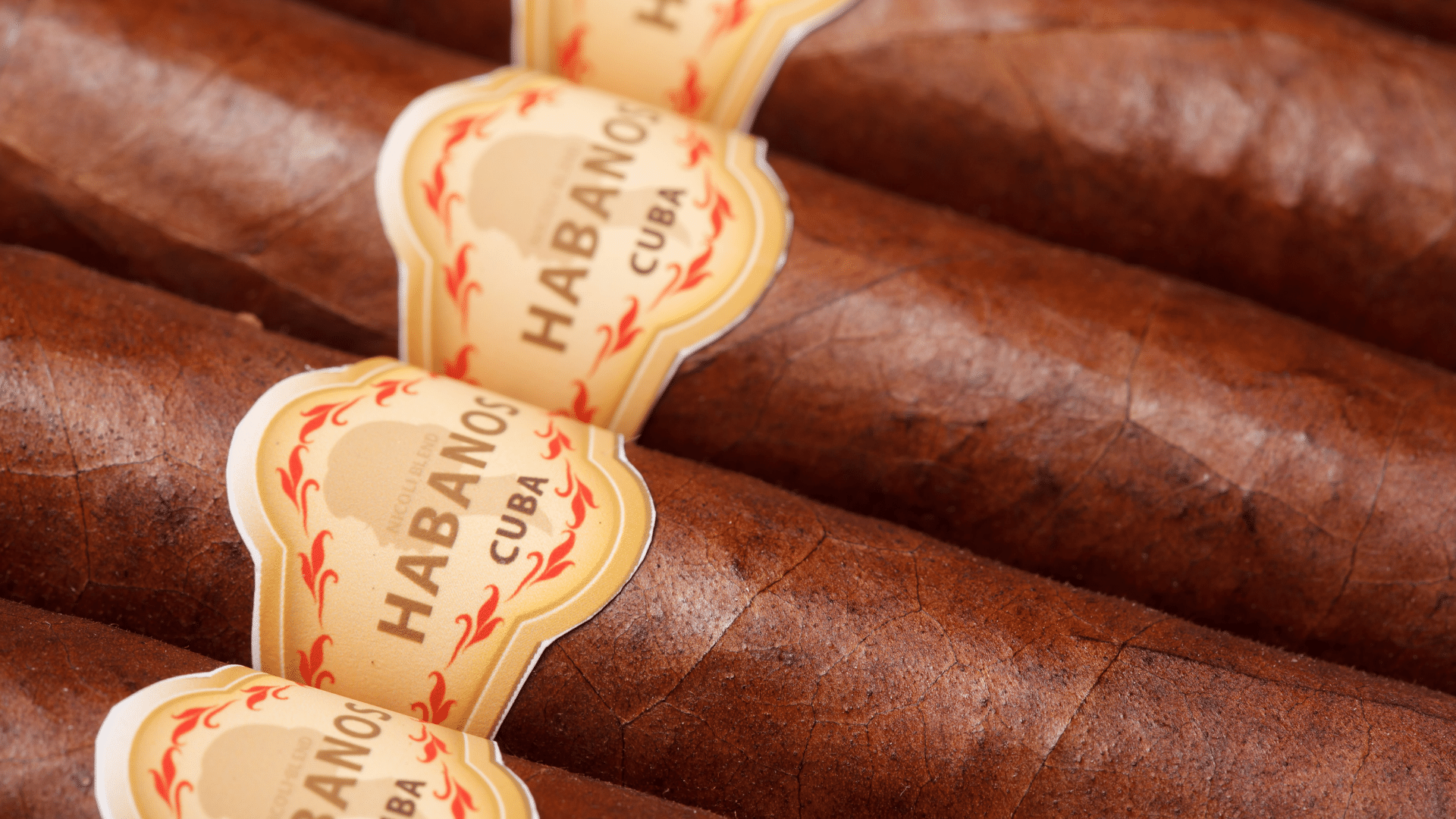
Image courtesy of Canva.
How to travel to different destinations around Cuba
One of the easiest ways to travel around Cuba is by bus. The Viazul bus network connects you to most cities and provinces. It’s also clean, airconditioned and largely reliable. It’s mostly frequented by tourists as the cost is out of reach for many Cubans. Some have toilets but bringing your own paper is recommended.
You can purchase your tickets here on the Viazul website or at the bus station. If you would like more information about buying tickets in person then visit a travel agency such as Havanatur, Cubatur or the information centre Infotur.
You should buy your bus tickets as early as possible, as there are a limited number and seats fill up quickly. Prices range from around $6CUC to $51CUC for longer journeys.
Another great way to get around Cuba is via taxi collectivo. You can book these through a travel agency, through your casa/ hotel or you can find them at the bus station. Most operate along the same fixed routes as the Viazul buses.
They usually sell every seat which can mean a cramped ride but are often faster and a similar price. You can also pay extra to have the car to yourself. Bear in mind that this is Cuba! Sometimes the cars aren’t in the best condition and may lack air conditioning.
It’s also possible to rent a car but it’s very expensive and numbers limited. They can also be of subpar quality and do not come with a GPS. This means that without access to online maps, navigating your way around the Island can be a challenge. Also, the roads are often in bad shape and if you get into an accident you won’t be able to leave the country until its resolved!
You can fly within Cuba, however it’s expensive, infrequent and can be unreliable. There are also trains but they are slow and often subject to long delays and cancellations.
Important note! When arriving in Cuba we’d recommend getting a taxi at the airport to take you to your casa or hotel. Because with no phone reception or internet upon your arrival, if there’s an issue with your pre-organised transfer, they won’t be able to let you know.
We learned this the hard way and waited an hour for our transfer to show before getting a taxi. It turned out that our driver had broken down and no one could let us know.
Ask you casa or hotel how much to pay for a taxi to your accommodation before you get to Cuba.
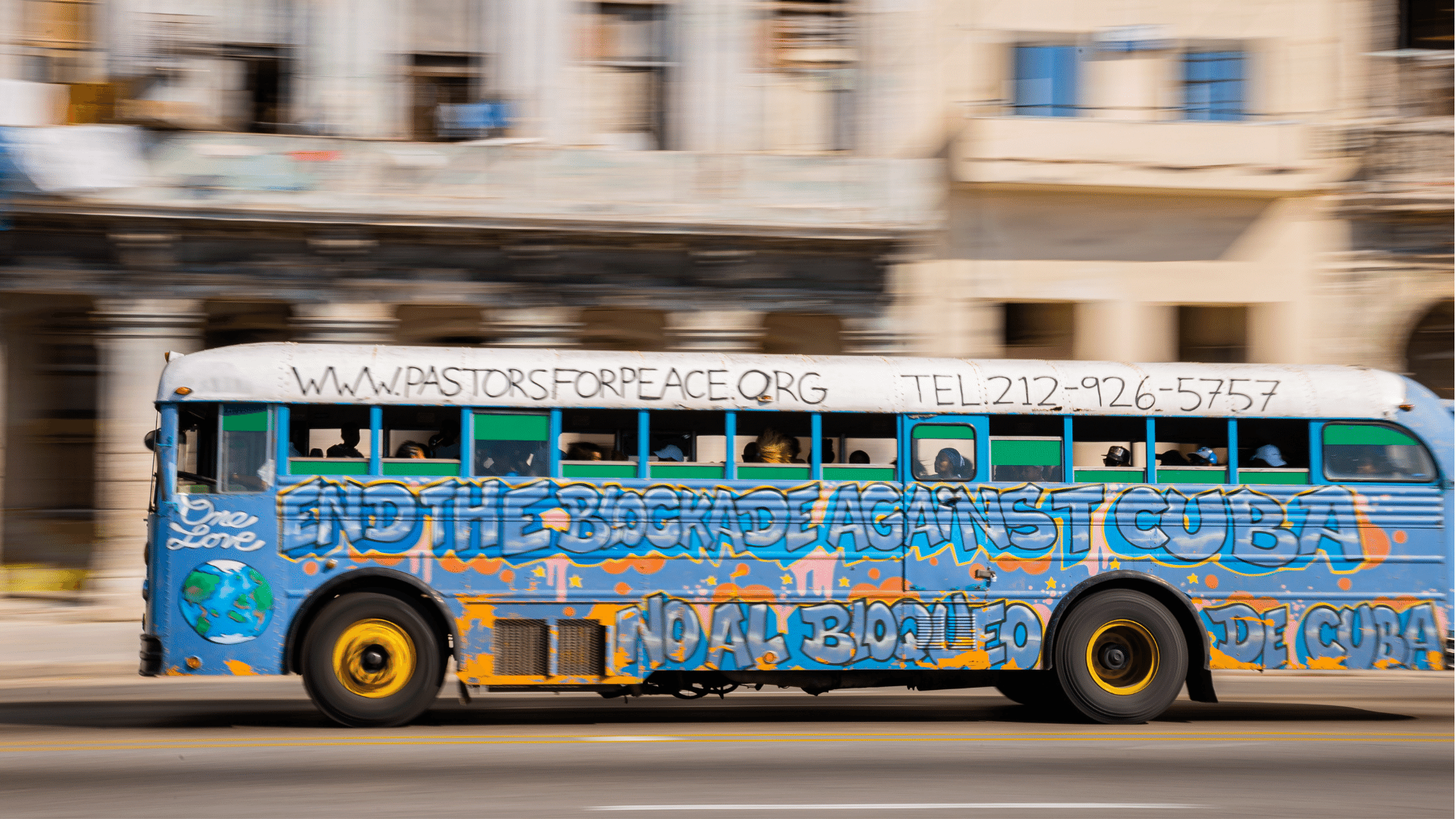
Bus in Cuba.
Photograph by Experiences Are Forever.
How to get a visa to go to Cuba
It’s important to know that most travellers will need to apply for a tourist card/ visa before entering Cuba. All western countries such as Australia, the UK, Canada, New Zealand, Ireland etc all need visas to enter Cuba.
Technically US citizens can’t visit Cuba for tourism purposes however they gain entry to see family, for work, religious reasons, aid work, journalism etc. Even if you’re not from the US but are flying from there, you cannot enter on a regular tourist card/visa. You will need to be travelling for one of these alternative reasons.
Americans can get around these restrictions by stopping over in ‘gateway’ cities such as Mexico City, Cancun and Toronto. They can change flights here and head to Cuba without the visa hassles they face when flying from the US.
We met many Americans who travelled this way and bought a regular tourist card/visa at their gateway city. They said that the Cuban officials didn’t stamp their passports, only their visa. So there was no record of them being in Cuba at all as far as the US was concerned.
You can get your tourist card/ visa online here. US citizens can organise theirs though Visa. Alternatively, you can buy a visa once you arrive in Cuba but you will be facing long lines.

Image courtesy of Canva.
You must have health insurance to visit Cuba
This one of the most important things to organise before any holiday. We would never leave the country without it, however in Cuba it’s mandatory and you may be asked to prove it.
If you haven’t organised it in advance, it’s possible to buy cheap Cuban health insurance at the airport, port or Marina. This is a good option for US travellers who don’t want to alert the US to the fact that they’re travelling to Cuba.
Cuba is a pretty safe country
After travelling extensively through Latin America and some of the Caribbean, we felt a little unsure about the level of safety in Cuba. We immediately assumed that if we took a turn down the wrong alley we could end up in trouble. We asked our host in Havana about this and we were told “No this is not correct – Cuba is completely safe! You can walk anywhere!”
As it turns out Cuba has one of the lowest crime rates in the world, largely due to a heavy police presence which sits on the side of the tourist. If a Cuban is caught committing a crime against a traveller there can be serious consequences.
We’ve read recently that petty theft is on the rise, meaning that carrying around huge wads of cash, or flashing valuables is not the best idea. But when is it ever?
During our time in Cuba however, we didn’t feel the slightest bit threatened.
We walked through the back streets of a variety of destinations with our good quality and rather large camera, without feeling any unease.
The Cuban people really are warm and welcoming and not everyone you come across is trying to scam you. We also found that the people outside of the most touristy parts seemed more genuine and less opportunistic.
With our broken Spanish we found making friends to be easy and met many people who were happy to stop, have a chat and pose for a picture without demanding anything in return.
As long as you are sensible, Cuba is a place that you can feel very comfortable exploring on foot without the danger of stepping into the wrong street.
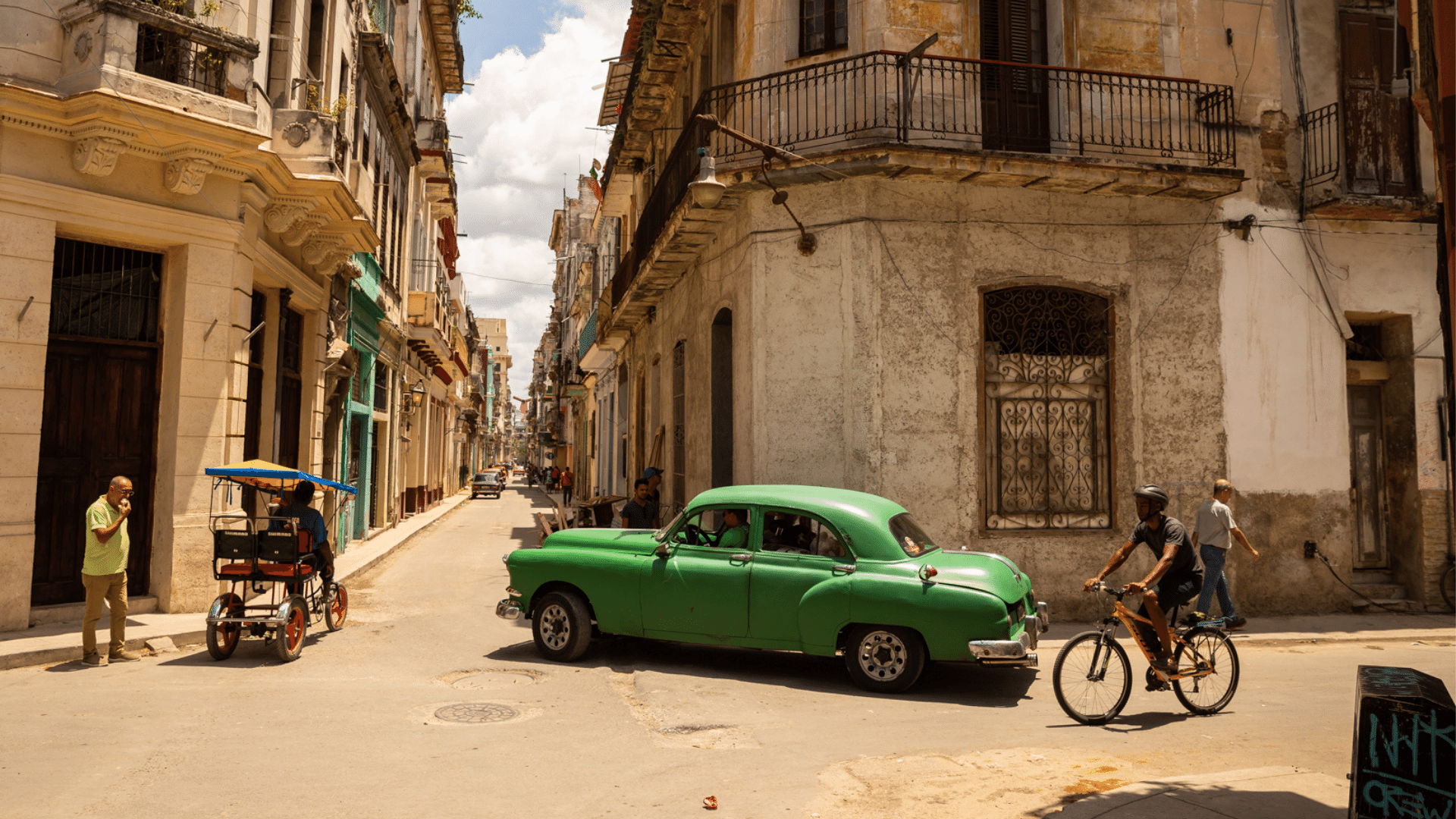
Back street in Havana.
Image by Experiences Are Forever.
You’ll need to learn some Spanish
Unless you are heading straight to an all-inclusive beach resort in Varadero, or your stay in Cuba is part of an organised tour, it’s important to know some Spanish to get by.
Many people you encounter in Havana will speak English. From your hotel staff and casa hosts to waiters and taxi drivers, most will speak enough for you to converse with. However, some won’t. And this will be more pronounced in areas outside of Havana, where a lot of people won’t speak any English at all. This means that you’ll need some Spanish to be able to communicate.
A great way to learn some Spanish quickly is via the Babbel app. We found this to be helpful when travelling through Latin America. In Cuba it can be good to have something on paper and we found the Lonely Planet Spanish Phrase Book & Dictionary to be very useful.
Can I drink the water?
There are conflicting views on whether the tap water in Cuba is safe to drink. Many say that it’s fine, but that it may have an unpleasant chlorine taste.
Even if this is true, certain travellers may experience stomach issues when being exposed to water they aren’t used to.
If you’re are staying in Cuba for a short period, such as a week or two don’t risk it. Bottled water is your best option for drinking, ice and brushing your teeth. If you are staying in Cuba for an extended period you may feel more comfortable experimenting with the local water. Although we wouldn’t recommend drinking it at all in country areas.

Image courtesy of Canva.
Vaccinations
When travelling to most destinations throughout the world you’ll need some vaccinations and Cuba is no different.
The WHO recommends you have the following vaccinations before travelling to this Caribbean island:
hepatitis A, hepatitis B, typhoid, cholera, yellow fever, rabies, meningitis, polio, measles, mumps and rubella (MMR), Tdap (tetanus, diphtheria and pertussis) chickenpox, shingles, pneumonia and influenza.
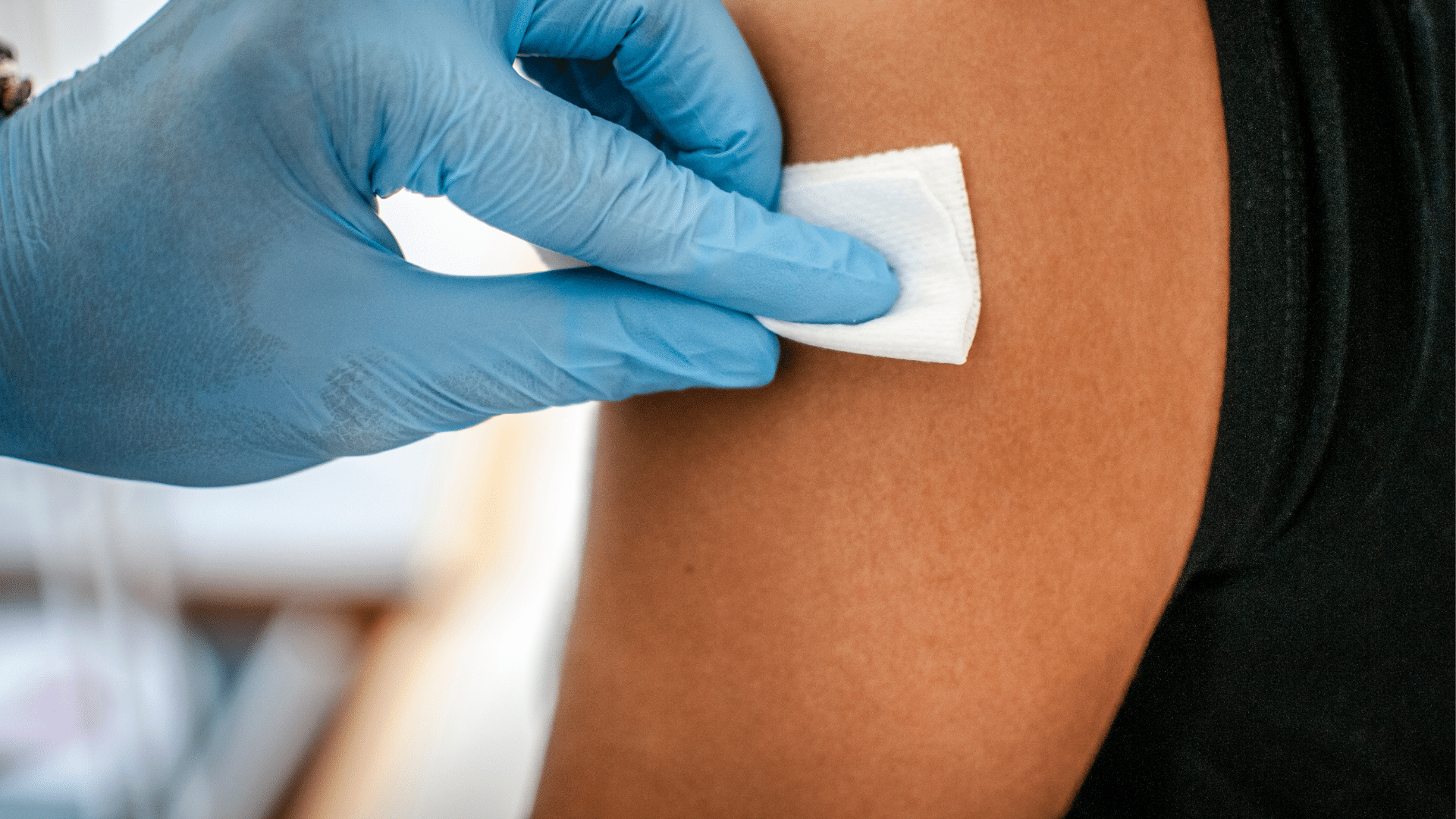
Finally, we hope this list of important things to know before you visit Cuba has helped you feel more prepared for your trip to this magical country.
The challenges that you may face will be minor compared with the rewards of travelling through one of the most culturally rich, vibrant and unique countries on earth.
If you have any more questions about Cuba please leave a comment below!
Looking for something specific? Try searching here.
Experiences
Are Forever
Live more & buy less
COPYRIGHT © 2020 EXPERIENCES ARE FOREVER LTD
ALL RIGHTS RESERVED - PHOTOGRAPHY AND WORDS CANNOT BE USED WITHOUT PERMISSION
0 Comments